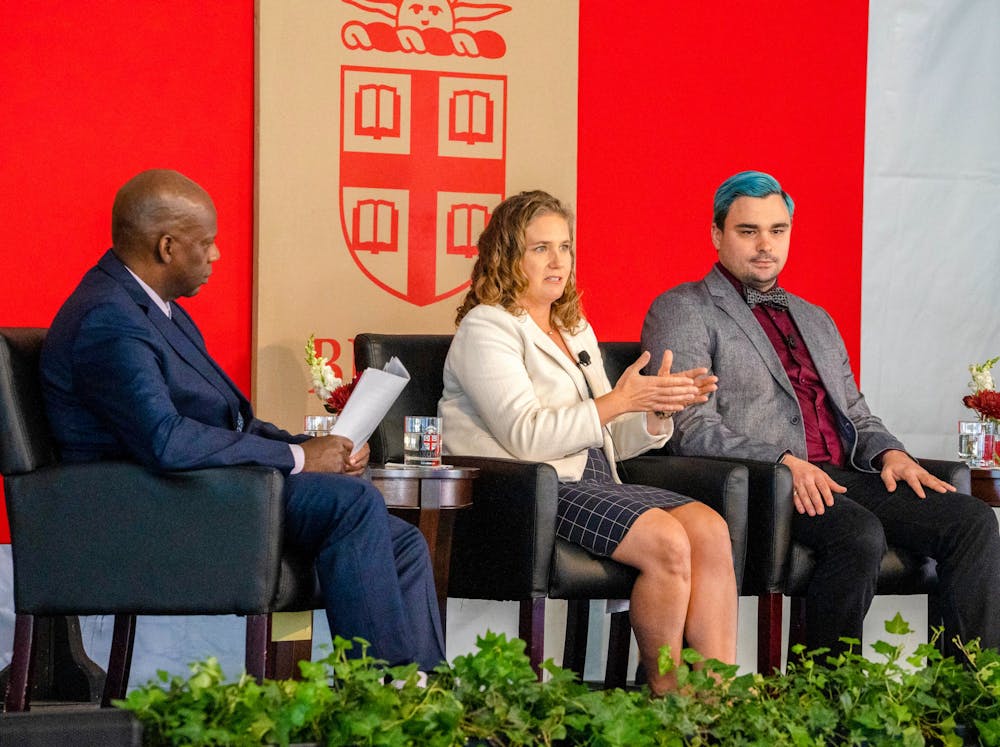The School of Public Health celebrated the launch of its Pandemic Center in a ceremony Oct. 12. Speeches from Jennifer Nuzzo, Pandemic Center director and professor of epidemiology, as well as Beth Cameron, Pandemic Center senior advisor and professor of the practice of health services, rang in the Center’s official opening.
The Center — with offices both in Washington, D.C. and on campus in Providence — will conduct research as well as engage with policymakers, non-governmental organizations and the private sector. It will also offer opportunities for faculty and student engagement and learning, Nuzzo said in an interview with The Herald.
According to Nuzzo, the challenges and experiences of COVID-19 were the impetus for the creation of the Center.
“This is not my first pandemic, but seeing how challenging COVID-19 was gave me deep worries about how we were going to handle the many events that we’re likely to experience in the future,” Nuzzo said.
“I think a lot of people assume that once COVID is over for good … that we’re fine for 100 years, and that’s very much not the case,” she explained. “We don’t have the kind of plans and readiness that we need to deal with the fact that we’re going to have more of these events in our lives.”
Nuzzo became interested in forming partnerships and collaborations to help address pandemic preparedness in public health and beyond. For example, Nuzzo noted that she had conversations with Ashish Jha — who is currently on leave as dean of the School of Public Health — last year. Jha, who is now serving as the White House’s COVID-19 response coordinator, said that he wanted to address her concerns at Brown, leading to the creation of the Center.
Cameron, who will be based in the Washington, D.C. office of the Center, first learned about the center through Nuzzo.
“When she told me that she was going to be inaugural center director, I was really excited about the opportunity to work with Jen,” Cameron said. “Jen wanted to tackle some of the hardest issues,” including vaccine uptake, community education and pandemic inequity.
The Center is exactly “where I wanted to be — looking at the hardest issues that came out of the pandemic response to COVID-19 so we can prepare better for the next emerging biological threat,” Cameron added.
According to Nuzzo, one goal of the Center is to reach across the entirety of the University, pulling engagement and research from numerous disciplines and fields.
“We want the field of public health to recognize that when (pandemics) happen, they touch all of health. They also touch all of society,” Nuzzo said. “I don’t think we fully understand the broader economic and social consequences of (pandemics), and it’s really important that we do.”
“One of the unique features of the Pandemic Center is that it will be multidisciplinary,” Cameron added. “We’re not going to find tools that will actually help communities be able to contain, respond and ultimately prevent pandemics unless we work across all of these fields.”
The Center also aims to engage in translational work by gathering evidence, synthesizing research and taking their findings to decision-makers in Washington, D.C. The hope, Nuzzo said, is that the Washington, D.C. office will be an important space for informing policy and engaging with policymakers domestically and abroad.
Aside from policy, the Center will also provide educational resources to the Brown community and the larger public, Nuzzo added.
“Brown, being a new school of public health, is in the perfect position to help redefine what public health education for the future ought to look like,” Nuzzo said. “The idea behind the … Washington hub for the Pandemic Center at Brown is (that) it will provide students with an opportunity to learn about public policy issues.”
The Center wants to focus on training the next generation of pandemic decision-makers and responders as part of a project loosely termed “pandemic game changers,” Nuzzo said.
The goal is to train people “not only in public health and biomedical science, but also in national security and foreign policy decision-making during a health emergency,” Cameron said.
According to Cameron, the Center is currently working on a course for students that “will start diving into some (pandemic) issues and will include opportunities for students to come to Washington and interface with Washington decision makers.” The Center intends to offer the course in 2023, Cameron said.
While the Center was recently launched and is still establishing its early initiatives and recruiting faculty, Nuzzo envisions the Center as “a cohort of research faculty … whose primary identity is that they’re a part of this Center,” along with affiliated faculty who will collaborate with the Center on particular projects.
One core faculty member, Scott Rivkees, professor of the practice of health services, policy and practice, hopes to bring his expertise as Florida’s former State Surgeon General and Secretary of Health to the center.
“There’s a distinction between public health and health policy,” Rivkees said. While public health refers to what measures are in place or can be put in place to keep populations safe, health policy refers to the laws, rules and regulations that need to be enacted to do that, Rivkees added.
“With my past experience, I hope to be able to bridge the gap between public health and health policy,” Rivkees said.
“One of the things that became really apparent during the pandemic is that there needs to be close ties between academic centers and public health” as well as “public health and health policy,” Rivkees said. “I think the Pandemic Center is going to play a really important role in bridging these areas."





